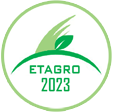The agri-food system facing complex challenges: Responses towards economic, social, environmental sustainability
The Conference is organized by ETAGRO, under the auspices of the School of Agriculture of the Aristotle University of Thessaloniki
The immense political, economic, social, and environmental challenges within which the global agri-food system is operating formulate a complicated context in which the system must discover the innovations and solutions that will ensure its performance and sustainability. Some of these challenges already exist, while others are reshaped or brand-new. The primary challenge for most countries globally, is to achieve food security, as political and economic disturbances cause uncertainty at the production level as well as in the operation of large supply chains. The energy crisis, as a new threat, jeopardizes the viability and competitiveness of farms and agro-industry. This situation is exacerbated by the effects of the climate crisis, which highlights the need for environmentally sustainable production systems and for solutions to reduce the environmental footprint of the agri-food sector – such as circular economy.
In Europe, the policy framework established by the new CAP 2023-27 and the Farm-to-Fork strategy – under the light of the European Green Deal – brings to the forefront, now more than ever, the need to reconcile the often conflicting goals of strengthening the resilience of the agri-food sector, protecting natural resources, and promoting quality of life in rural areas. Under the nexus of these challenges, the depopulation of rural areas is intensifying, leading to further loosening of social ties and loss of cultural heritage. Farmers operate under the influence of new demands and are in dire need of advisory support and an operational Agricultural Knowledge and Innovation System (AKIS) in order to balance within the changing structure of the farming sector. On the other hand, as a result of “eco-anxiety” and societal issues, society is increasingly looking for new dietary patterns and foods that meet criteria such as locality, the sustainable use of natural resources and the interface with a healthy lifestyle. In this complex setting of requirements, challenges and risks, but also of opportunities, the need to connect research and innovation with the agri-food system and social expectations calls for attention more than ever.
Some of the questions raised are:
How will the rural world be able to develop solutions and innovations to meet these challenges?
How could science contribute to increasing the resilience of the agri-food system?
What is the role of new technologies, digitalization and smart farming?
What are the necessary synergies between farming and other activities in rural areas to improve sustainability?
What are the patterns of organization and cooperation among actors in the agri-food system to ensure sustainable development and social cohesion in rural areas?
What is the social and economic sustainability of alternative and environmental-friendly production systems (including – but not restricted to – agroecology and hydroponics)?
What are the adoption patterns of innovative production methods, practices and systems and which policies and strategies could improve them?
What are the evolving consumer profiles? Which are the agri-food production patterns and alternative products that will fulfil their expectations and what is the role of certification and labelling?
What are the non-market values associated with environmental-friendly food production?
Important dates
Extended abstract submission
All submissions will be reviewed through a fully digital peer review process by at least two referees. Submissions will be handled by an Online Submission System that has been set-up for ETAGRO 2023.










